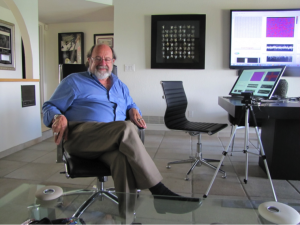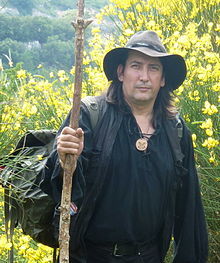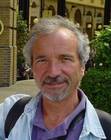Victor E. Smith's Blog, page 3
February 28, 2019
John Nelson: The Miracle of Anna
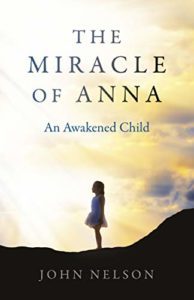 In the “Acknowledgements” section of The Miracle of Anna: An Enlightened Child, the author John Nelson states, “Spiritual or visionary fiction has always been a difficult genre for publishers”; and, as a Visionary Fiction Alliance member myself, I would add that it is a difficult genre for writers and readers also.
In the “Acknowledgements” section of The Miracle of Anna: An Enlightened Child, the author John Nelson states, “Spiritual or visionary fiction has always been a difficult genre for publishers”; and, as a Visionary Fiction Alliance member myself, I would add that it is a difficult genre for writers and readers also.
In The Miracle of Anna, John Nelson ventures far from his roots in hard science, including science fiction, and attempts to tackle the difficult genre recently re-emerging as Visionary Fiction (see Wikipedia for its definition and description). Drawing on the life story of the 20th-century Hindu guru Sri Anandamayi Ma, to whom the book is dedicated, Nelson has a enlightened guru with marvelous spiritual and psychic powers reincarnate in 21st century California. The basic plot is offered in the Amazon book description.
The story is told simply, its deep spiritual truths embedded in the plot,as it should be. For my taste, the language and style is banal at times (part of the reason for the deduction of a star) and I certainly found myself wanting to find out the rest of the story when I came to the end of the book (a sequel in the works, John?)
The book’s strength is in its main hypothesis: what would (does) happen when a soul, enlightened with a process that covers many lifetimes and includes clearly recalling the lessons of those lifetimes, returns to a society that not only views reincarnation as crazy talk but also the activities of an enlightened being, especially if they are only a kid, as insane behavior. If you can even speculate along these lines, John Nelson’s The Miracle of Anna deserves your attention.
John Nelson is a former editorial director, and now owner of Bookworks Ltd. Prior to this he was editorial director of Bear & Company and Inner Oceans Publishing. John is a prolific author of sci-fi and spiritual fiction and non-fiction, including novels I, Human, Starborn and the award winning divination guide The Magic Mirror. Born on the East Coast of the USA, John now lives in Hawaii.
The post John Nelson: The Miracle of Anna appeared first on Victor E. Smith.
February 23, 2019
Joseph McMoneagle: Memoirs of a Psychic Spy
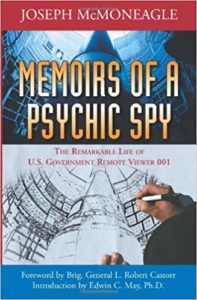 Joseph McMoneagle has been acclaimed the best operational Remote Viewer in the history of the U.S. Army’s Special Project Stargate.
Joseph McMoneagle has been acclaimed the best operational Remote Viewer in the history of the U.S. Army’s Special Project Stargate.
To one unfamiliar with “remote viewing” this means little, so a definition, right from book is in order: “Remote viewing is a human ability to produce information about a targeted object, person, place, or event, while being completely isolated from the target by space, time, and other forms of shielding.” (For those who would claim this is impossible, I suggest they stay open to the evidence presented in this book and several others on the subject.)
At the start of the book, The Stargate Chronicales: Memoirs of a Psychic Spy, McMoneagle states why he dedicated his life to the perilous pursuit of a seemingly odd intelligence activity that exposed him to ridicule and beyond: “It was then and still is my opinion that remote viewing is the greatest threat to my nation, and at the same time, possibly the single greatest discovery in our species’ history. Remote viewing, when used correctly, has a capacity to make extensively destructive and creative contributions in our development.”
A must-read for anyone interested in the theory and practice of scientific remote viewing for any purpose, but one also peppered with critical details on other paranormal phenomena to be found in the toolbox of a psychic practitioner. McMoneagle also has much to say, based on extensive observation and experience, on the genesis of paranormal perception. An example of his balanced appraisal of the role of the Near-Death Experience (NDE) in the subsequent development of remote-viewing capacity: To those who cited his NDE (he had several) as the primary factor behind his exceptional remote viewing ability, he says, “I vehemently disagree with such a perception. It takes a lot more than a single experience to build the philosophic and spiritual structure of an individual. Certainly, an NDE has a great deal of impact, but it is more the straw that breaks the camel’s back than a single transformational event.”
For those interested in the history of remote viewing and its connection to the US Intelligence establishment, McMoneagle’s several decades behind that firewall gave him access to many of the people, places and activities that constituted the various official remote viewing programs, of which Stargate was one. He tells of the experiments that started at Stanford Research Institute in the early ‘70s with pioneers like Ingo Swann, Hal Puthoff, and Pat Price. He spent years in related programs at Fort Meade as a remote viewer for the government agencies. McMoneagle collaborated with Robert Monroe and his Institute for studying the development of consciousness during and after his military career. In other words, wherever remote viewing was being developed, by the government or private effort, McMoneagle was there, and his frank appraisal of all such endeavors under one cover are priceless.
In the book, he concludes: “Regardless of how one might feel about the efficacy of using the paranormal for intelligence gathering, I can emphatically state that it works, it’s here, and it will continue to be reinvented from time to time, until it becomes part of the established, historically accepted background. Wishing it can’t, or won’t, doesn’t make it go away, and doesn’t make it any less effective in the new understanding of modern warfare techniques.”
We have been duly warned. We remain ignorant of the paranormal at our own risk.
The post Joseph McMoneagle: Memoirs of a Psychic Spy appeared first on Victor E. Smith.
February 16, 2019
Elaine Pagels: Why Religion?
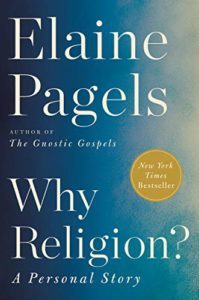 I’ve been long familiar with and deeply impressed by the ground-breaking research and writing of Dr. Elaine Pagels in the realm of traditional and apocryphal biblical translation and interpretation. Her approach to religion and spirituality infused my own writing, which include the role of the so-called Gnostic gospels in the formation of the Christian era. Most of her scholarly works were written before or shortly after the turn of the millennium.
I’ve been long familiar with and deeply impressed by the ground-breaking research and writing of Dr. Elaine Pagels in the realm of traditional and apocryphal biblical translation and interpretation. Her approach to religion and spirituality infused my own writing, which include the role of the so-called Gnostic gospels in the formation of the Christian era. Most of her scholarly works were written before or shortly after the turn of the millennium.
So, I was delighted to discover that Dr. Pagels had authored a new book published in 2018 called Why Religion? A Personal Story. The title struck me as curious for her: what personal connection would an author, who spent her life working with texts that Christianity disdained as heretical, have formed with the typical “religion” (she does not use “spirituality” in her title. As a fan of the underdog, in this case the almost-obliterated Gnostics, I bought the book and started to read with the ample caution I’ve formed against anyone who attempts to sell me something packaged as religion.
I should have known that Pagels would not disappoint. In fact, she surpassed my expectations. This book is more about Elaine the wife, mother, and vulnerable human being that I did not get a chance to meet in her earlier works. I should also have known that it was going to be a tear-jerker. When the core of the story has the author telling blow by blow how she pushed herself through the tragic loss of her five-year- old son compounded a year later by the shocking death of her husband in a hiking accident, no eye can remain dry. Elaine does not spare herself or the reader the pain of so much suffering, but neither does she turn aside from the hard questions such tragedies, which happen in some form to all human beings, slam us with: Why do bad things happen to good people?
She does not run away from self-questioning and, while listening to other, insists on arriving at her own answer. Speaking of her young son, she writes: “During those dark, interminable days of Mark’s illness, I couldn’t help imagining that somehow I’d caused it. If guilt is the price we pay for the illusion that we have some control over nature, many of us are willing to pay it. I was. To begin to release the weight of guilt, I had to let go of whatever illusion of control it pretended to offer and acknowledge that pain and death are as natural as birth, woven inseparably into our human nature.”
In another place, she flies into the face of those who would try to console the inconsolable with an appeal to the goodness of the Almighty: “For if we believe that an all-powerful God created a ‘very good’ world, what happened to it? While the Buddha declared as his first noble truth that ‘all life is suffering,’ Jewish and Christian theologians, on the contrary, speak of ‘the problem of suffering,’ as if suffering and death were not intrinsic elements of nature but alien intruders on an originally perfect creation.” That hurts to have to work your way through.
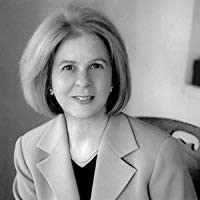 Dr. Elaine Pagels
Dr. Elaine PagelsThese are just a couple of examples of the poignant way Dr. Pagels relates the process of facing suffering as it is and arriving to the wisdom that allows us to understand and endure the unimaginable. She informs us of other familiar attempts to escape that she tried, only to return to the deep contemplation she wrote about as a scholar. Speaking of a document, The Gospel of Truth, she once rescued from oblivion and translated into English, she applies it to her tragedy as a balm to help her heal herself:
“I’ve come to love this poetic and moving story for the way it reframes the gospel narrative. Instead of seeing suffering as punishment, or somehow as ‘good for you,’ this author sees it rather as Buddhists do, as an essential element of human existence, yet one that may have the potential to break us open out of who we are. My own experience of the ‘nightmare’—the agony of feeling isolated, vulnerable, and terrified—has shown that only awareness of that sense of interconnection restores equanimity, even joy.”
No synopsis or review can replace the experience of a book like Why Religion? A Personal Story. It must be read, cried with, pondered over, and perhaps reread. If you suffer from an event that seemed undeserved, unfair, beyond the ability to bear, beyond the possibility to heal, please read this book.
The post Elaine Pagels: Why Religion? appeared first on Victor E. Smith.
July 20, 2018
Dark Star Rising by Gary Lachman
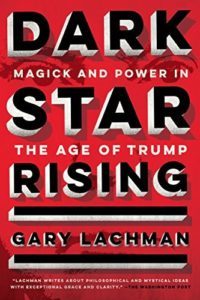 A longtime fan of the subjects Gary Lachman writes about and of his way of writing about those chosen topics (the occult, imagination, mysticism) and people (Steiner, Jung. Crowley), I jumped to buy and inhale Dark Star Rising: Magick and Power in the Age of Trump on first noticing its availability. Since I am writing this review in July 2018, five days after Trump’s controversial “summit” with Vladimir Putin in Helsinki, I had to wonder how it would stand up to the currently evolving reality-tv drama that Trump was staging in daily dizzying installments. Could Lachman possibly insert something cogent into the helter-skelter fray between warring sides willing to spare no insult but brook no rational conversation?
A longtime fan of the subjects Gary Lachman writes about and of his way of writing about those chosen topics (the occult, imagination, mysticism) and people (Steiner, Jung. Crowley), I jumped to buy and inhale Dark Star Rising: Magick and Power in the Age of Trump on first noticing its availability. Since I am writing this review in July 2018, five days after Trump’s controversial “summit” with Vladimir Putin in Helsinki, I had to wonder how it would stand up to the currently evolving reality-tv drama that Trump was staging in daily dizzying installments. Could Lachman possibly insert something cogent into the helter-skelter fray between warring sides willing to spare no insult but brook no rational conversation?
While Lachman never suggests that he has all the answers to the mind-numbing enigma of the 2016 election and administration that resulted from it (in the interest of full disclosure and to avoid pretending that the winner of that election did not matter to me, I am an independent who never dreamed that Donald Trump would win), Dark Star Rising is filled with “food for thought” that parties on both sides might digest with benefit.
Positive Thinking and Chaos Magick
While it might not endear him further to the Christian fundamentalists who had to endorse him for lack of a better choice, Trump holds himself to be a devotee of “positive thinking,” proclaiming that he is the “greatest student” of the man who wrote the book, The Power of Positive Thinking: Reverend Norman Vincent Peale. Thus, contrary to a frequent criticism, he is not an unbeliever; he unconditionally believes in himself. And in addition to Dr. Peale, he is the good company of a whole sequence of spiritual teachers, mostly American, and often grouped together as New Thought.
The “Great Leader”
On the other hand and despite his old-dufferisms, Trump “seems to be something of a ‘natural’ chaos magician…like New Thought, chaos magick (the “k” a nod to Aleister Crowley) is interested in results, in ‘making things happen.’ It pursues ‘visible results by which the magician demonstrates to himself that he can do things which, a short while ago, never entered his mind as possibilities.” This description rang more bells for me about Trump’s modus operandi than the millions of words spewed about him since he came down the Trump Tower elevators and announced his candidacy for POTUS.
But a POTUS has to be elected with votes garnered fair or foul; and Lachman forwards an unflattering opinion of those who ushered Trump into the White House: “The desire Hitler and Mussolini met in millions of people was a simple one: to be free of the burden of giving meaning to their lives themselves, of fulfilling their hunger for ‘struggle and self-sacrifice,’ for some greater purpose than the satisfaction of their own appetites, through their own efforts. This is a temptation we all face at some time.”
“The great leader,” Lachman describes such populist dictators, “is antinomian, that is, not held back by the rules and not responsible to anyone but himself. He is beyond good and evil, and logic too, or at least is the author of their definition. It is this presumed infallibility that gives him his power over a flock or a nation.” If this shoe fits Trump, and Lachman makes a plausible case for it, our democracy is in clear and present danger.
While this book will provide further philosophical and even spiritual arguments to those already opposed to Trump, it could prove to be an eye- and mind-opener to those “true believers” who hold him infallible no matter what. Now, to get them to read it….
The post Dark Star Rising by Gary Lachman appeared first on Victor E. Smith.
June 12, 2018
Test Post 6-12-18
This is a test post to determine if the URL is accessing the new site or not
April 7, 2017
Visionary Fiction and the Science of Consciousness Series
Dr. Gary Schwartz, Scientist and Parapsychologist
In March-April 2017, I wrote a three-part series for the Visionary Fiction Alliance website entitled “Visionary Fiction and the Science of Consciousness.” Given the audience there, it is tailored to authors and readers of the Visionary Fiction genre. However, it contains information, insights, and references for those more generally interested in paranormal phenomena and developments in science-based parapsychology.
Dr. Gary Schwartz
Featured is the work of Dr. Gary Schwartz, an accomplished scientist with his Ph.D. from Harvard, who taught psychiatry and psychology at Yale, and is currently professor of psychology, medicine, neurology, psychiatry, and surgery at the University of Arizona. He has published more than 450 scientific papers, including six in the prestigious journal Science, co-edited 11 academic books, and authored 8 books for the general public. He also serves as the director of the U of A’s Laboratory for Advances in Consciousness and Health (LACH).
My initial encounter with Dr. Gary Schwartz’s work came back in 2002, when I read The Afterlife Experiments: Breakthrough Scientific Evidence of Life After Death. As a visionary fiction novelist who focused on the paranormal, it was rare to find a traditionally credentialed scientist/educator willing to put the words “scientific” and “life after death” in the same book much less in its title.
Fate, or synchronicity, would have it that I found myself in Tucson, where Dr. Schwartz lives and works. Our paths, seemingly inevitably, crossed as did our interest in the paranormal. After hearing him lecture on his two recent works, An Atheist in Heaven: The Ultimate Evidence for Life After Death? (April 2016) and Super Synchronicity: Where Science and Spirit Meet (February 2017), and some direct discussion between us, decided to write this series on the VFA site as my reflections on the chemistry that ensues when the two universes, Science and Spirituality, get into positive and interactive relationship. Things happen!
I invite you to jump to Part 1 of Visionary Fiction and the Science of Consciousness on the VFA site. Links to Parts 2 and 3 will be found at the end of each section. Enjoy and leave a comment should something strike you as of interest.
March 7, 2017
Super Synchronicity by Gary E. Schwartz Ph. D.
My initial encounter with Dr. Gary Schwartz’s work came 15 years prior to the publication of Super Synchronicity. In 2002, The Afterlife Experiments: Breakthrough Scientific Evidence of Life After Death by this accomplished scientist with a Ph. D. from Harvard, professorship at Yale, and then a directorship of the Human Energy Systems Laboratory at the University of Arizona, caught my interest. As a visionary fiction novelist who focused on the paranormal, it was rare to find a traditionally credentialed scientist/educator willing to put the words “scientific” and “life after death” in the same book much less in its title. I followed Dr. Schwartz through the years as he put out volume after volume that brilliantly and bravely brought science and spirituality closer together without wandering too far into either the wooly pasture of woo-woo or into the prickly desert of ultra-skepticism.
Super Synchronicity: Where Science and Spirit Meet
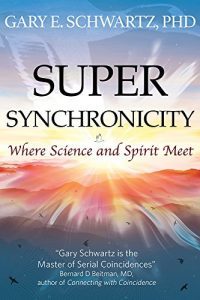 Living as I do in Tucson, home of the University of Arizona, I was fortunate to have been able to attend two recent back-to-back IONS (Institute of Noetic Science) lectures featuring Dr. Schwartz and his most recent works, so I was warmed up and forewarned when I went to read Super Synchronicity.
Living as I do in Tucson, home of the University of Arizona, I was fortunate to have been able to attend two recent back-to-back IONS (Institute of Noetic Science) lectures featuring Dr. Schwartz and his most recent works, so I was warmed up and forewarned when I went to read Super Synchronicity.
For someone coming cold upon the concept of synchronicity, this book might be a “You’ve got to be kidding.” Perhaps why Gary’s degrees and experience are necessary to make him a credible messenger.
Quantum Synchronicity Theory
But as a writer who already knew, as Gary points out in the book, that reality is often stranger than fiction, I was familiar with the concept and experience of synchronicity, even supersynchronicity (six or more events “in close proximity that do not seem to have any causal connection but are still related meaningfully for certain people”). But I had little idea how many others also had such experiences and in what quantities, what causal agents might be assigned to such events, or that the experience could leaven to the point of synchronicity overload. All this and more I learned from Dr. Schwartz’s clear exposition of the complexities of a subject presented with a chatty tone that made me feel like a personal relationship was developing with the author as I read. He was even kind enough to forewarn me of upcoming technical or mathematical swamps, suggesting I skip over areas that seemed too deep.
Nor did this become an adventure in psychic voyeurism as some paranormal books can be. At least since Carl Jung’s Synchronicity: An Acausal Connecting Principle published in 1960, synchronicity has been studied as a psychic complement or alternative to classical scientific causality. At one point, Dr. Schwartz gently but logically proposes what he calls the Quantum Synchronicity Theory (QST), deftly using the wave-particle concept of quantum physics to explain how without contradiction synchronicity can be simultaneously singular and plural, subjective and objective. At another, he soars to mystical heights and posits that supersynchronicities are always and everywhere, dramatic manifestations of the One Mind that is all that there is. Heady propositions, to be sure, put forward authoritatively but humbly by an accomplished scientist who has walked many times the many miles of the exotic journey of which he writes so eloquently.
Highly recommended to everyone who wants to make their life a richer blend of science, self-knowledge, and spirituality.
December 1, 2016
Channel of the Grail Acclaimed by Richard Stanley
My second visionary/historical novel, Channel of the Grail, published in May 2016, has received high praise from noted author and filmmaker, Richard Stanley. After reading the manuscript prior to publication, Richard wrote:
Richard Stanley
“I have indeed read ‘CHANNEL’ and liked it a great deal. …I believe this is beyond doubt the best literary evocation of the Rahn affair and the enigma of the Graal Pyrenean that I have read to date and puts the research to excellent use without it ever getting in the way of narrative flow and the deeper spiritual issues.
“In many respects your work shadows and compliments my own in the ‘DANGEROUS GODS’ manuscript that will see publication from Feral House later this year. Particularly fascinating to me is the way we have often jumped off from identical starting points only to proceed in utterly different directions – all of which serves to highlight the multifoliate complexity of the Grail itself. Congratulations, sir! My hat is truly off to you.”
With his films, writing, and the Terra Umbra website, Richard Stanley serves as the consummate custodian of Otto Rahn’s legacy from his home base in Montsegur, France. He completed The Secret Glory, an examination of Otto Rahn’s search for the Holy Grail, in 2001. He launched the interactive website Terra Umbra – Empire of Shadows in October 2009 and released the e-book Shadow of the Grail – Magic and Mystery at Montsegur in December 2010. We look forward to Richard’s Dangerous Gods soon to be published .
I appreciate the maestro’s warm endorsement and invite you to order and read Channel of the Grail. It is available at Amazon.com in print and as e-book or from most other e-book vendors including Apple’s I-books.
May 10, 2016
Channel of the Grail Published
My second major novel, Channel of the Grail: A Novel of Cathars, Templars, and a Nazi Grail Hunter (formerly titled The Perfect) was released on May 3, 2016, and is now available for purchase either in print or eBook through Amazon.com
Even death cannot stop two hearts that beat as one.
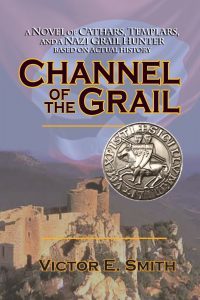 In May 1939, German newspapers announced the untimely death of 35-year-old author Otto Rahn, applauding him as “comrade, decent SS-man and creator of outstanding historical-scholarly works.” But his Swiss lover Raymond knew that Otto had neither died accidentally nor as a member of the infamous SS.
In May 1939, German newspapers announced the untimely death of 35-year-old author Otto Rahn, applauding him as “comrade, decent SS-man and creator of outstanding historical-scholarly works.” But his Swiss lover Raymond knew that Otto had neither died accidentally nor as a member of the infamous SS.
Before the Nazis, Rahn had researched the medieval French Cathars, a heretical sect exterminated by war and the Inquisition, and he published his account of this tragedy as Crusade against the Grail.
His book fascinated Reichsführer-SS Heinrich Himmler, an occult fanatic, who then enticed Otto into the SS as a historical researcher. Gambling that Otto’s psychic talents might lead to the recovery of the coveted Holy Grail for the Nazis, Himmler coddled the writer, even condoning his illegal homosexuality. Then Rahn came to discover that the SS and its operations were far from benign.
After Otto’s demise, Raymond knew that his partner’s work deserved recognition, but as a genuine Grail bearer and not as a member of the SS. To do this, Raymond had to recover his own unique gift: a phenomenal memory that took him back to the Cathar era where the men’s mutual mission, which could only be carried out with them riding two to a horse in the way of the Knights Templar, was first entrusted to them.
Channel of the Grail is a visionary novel, historically based on the medieval Cathar persecutions and the 20th century life and times of Otto Rahn.
Advance Praise for Channel of the Grail
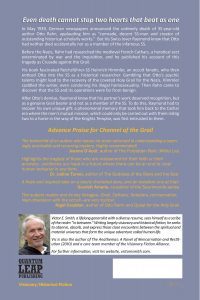 The brainchild of an author who leaves no stone unturned in understanding a seemingly unsolvable and recurring mystery. Highly recommended!
The brainchild of an author who leaves no stone unturned in understanding a seemingly unsolvable and recurring mystery. Highly recommended!
Jeanne D’Août, author of The Forbidden Relic (White Lie)
Highlights the tragedy of those who are massacred for their faith or their ancestry…reinforces our hope in a future where there can be an end to cruel human behavior in any form.
Dr. Jodine Turner, author of The Goddess of the Stars and the Sea
A fresh and inspired take on a dearly cherished story, and an excellent one at that!
Scarlett Amaris, co-author of the Saurimonde series
The subject matter and its key linkages—Grail, Cathars, Templars, reincarnation, Nazi obsession with the occult—are very topical.
Nigel Graddon, author of Otto Rahn and Quest for the Holy Grail
February 27, 2015
Book Review: Redemption by Jacklyn Lo
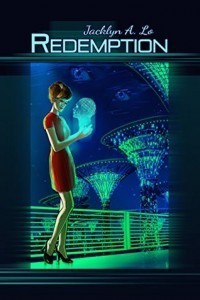 A Breezy Route to Redemption via Reincarnation
A Breezy Route to Redemption via Reincarnation
Jacklyn Lo’s debut novel, Redemption, is a fast-paced and somewhat trippy read—Artificial Intelligence meets New Age—which enters the burgeoning Visionary Fiction genre market (Reincarnation sub-category) with bursts of brilliance that bodes well for her future.
Skipping over any plot summary, which is included in several other reviews, I’ll comment on Redemption’s place in the increasingly sophisticated multi-lifetime fiction arena (think Kate Atkinson’s Life after Life or MJ Rose’s Reincarnationist series as examples). Ms. Lo’s plot structure in presenting the several past incarnations, which contribute to the protagonist’s current lifetime challenges and her future destiny, is simple, sometimes elegantly so, and linear, sometimes too much so to be credible or soul-shaking.
Ann, an attractive and accomplished AI executive with an electronic guru always on hand, experiences ever-deepening angst despite her material success. To resolve a disconcerting recurring dream, she makes a series of visits to a psychic, who lives in the seedy part of town, and, with little ado about the process, is regressed forward in chronological sequence through five lives in very different historical settings (she is even male, a castrated priest of Isis, in one of them). Each lifetime is a well researched and written vignette that corresponds to the spiritual principle (Freedom, Love, Courage, Peace, too obviously announced in the titles of the book’s parts) the lifetime is designed to imbue into the evolving soul on its path to salvation.
The end result of this collage, despite the futuristic setting of its binding story, is that of the medieval morality play, such as Everyman, where plots and people represent abstracts rather than specific characters. The book has sufficient substance and excitement to appeal to a young adult audience or to the curious who are new to the visionary fiction/reincarnation genre. Connoisseurs of the category looking for a more intricate treatment of the subject might, however, find Redemption’s route through the intricate matrix of our universe too easy in Ms. Lo’s depiction.
********
 Click to subscribe to this site’s RSS Feed.
Click to subscribe to this site’s RSS Feed.Click this link to order a copy of The Anathemas, a Novel about Reincarnation and Restitution. Copyright 2013 by Victor E. Smith. All rights reserved.
Share your thoughts on this post. Put in your comment in the space below. Thank you.

